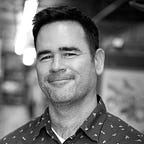Maybe Someday
Wilderstory 01
“Have you seen it? You’re coming from that direction — so I thought maybe.” Carl reached into his chest pocket for the photo, “Haven’t been there myself. But I’ve heard tell from folks passing through.”
There was a constant flittering sound coming from the plastic flags. They were the triangle-shaped ones, usually seen strung up around used car lots or at grand openings.
Abe noted their repeating pattern; red, white, yellow, blue. The wind pushed and pulled and yanked them along thin nylon cords, lending a very specific sort of energy to the old DX station. “Like Tibetan prayer flags,” he thought.
Carl stepped around the gasoline pump and handed the photo to Abe. “Peanut farmer from Texas saw it. Told me it was a religious experience. Like seeing the face of God.”
Abe took the photo, noticing how large his thumb and fingers were compared to Carl’s. He sat down on the seat of his motorbike as Carl continued, “Other folks say it’s like Stonehenge.”
The sound of a diesel engine clattered lazily toward them from the highway. Abe looked past Carl to see a small school bus approaching; white with rust spots and hand-painted lettering on the side.
St. Abigail’s in large type.
And in smaller script, Home for Girls.
It pulled in with a billow of dust and a labored sputter, stopping on the other side of the pumps. With it came a smell and a heat all its own.
Carl pulled at his cap to wipe the sweat from his face. He turned toward Abe, “Ain’t never been to England — so I wouldn’t know,” he laughed, “Hell, I never been east of Clovis.”
The bus door opened. A noisy group of girls tumbled out, followed by the driver, who pulled herself around the door to let the children past.
She looked like a teacher on class photo day, wearing a simple sundress with abstract floral shapes; blobs of color that suggested vague petals and leaves. Her cheeks were flushed, and her hair — which was piled up in a classic beehive — was clinging to her temples in little wet curls.
“Can you fill me up?” She asked, squinting through her glasses at Carl, “We need to get to Gallup for recital, and we’re running …” she paused to look down at her watch, “Well, let’s just say we’re running late.”
Carl sprang into motion. “Sure enough.”
Abe looked on as Carl gassed up the bus. The woman waved her hand in front of her chest, trying to stay cool. As the last few children stepped off, she leaned down to grab one by the elbow.
“Dot — here’s two dollars. Get me some Rooster Stix,” she said, “And get something for yourself.”
The girl took the wadded bills and pushed them into her pocket. She stepped lightly over a curb between the pumps and emerged in front of Abe’s motorcycle.
Her hair was short and dark and pulled on both sides into pigtails. She wore a simple jumper and large rubber boots that were tied with laces in the front. And her long sleeves were striped, black and white.
Slung to her back was a satchel that held a slim, shapeless rag doll. It looked homemade — like a floppy tube of fabric with sewn-on arms and buttons for eyes. Its head bobbed in a loose sort of way, nodding aimlessly back at Abe as the girl scuffed along.
She seemed at odds with the others. Different. Alone. Both quieter and wilder at the same time.
“It’s hot as hell,” spouted the driver, stepping out in front of the bus and peering down the highway. She swatted at a fly, smacking the side of her neck with a sweaty plap. The gas pump ticked with a syncopated rhythm as black and white numerals slowly rolled up inside its glass housing.
Abe sat squarely on his motorcycle. He looked down at the photo Carl had given him.
Most of the image was that of a big blue sky with a flat horizon along the bottom. But jutting up from the ground was a slanted row of shapes. Angular. Rectangular. Odd. But also familiar.
They were automobiles; their front ends punched into the earth like so many daggers. The sun glinted off their metallic forms. Abe imagined they looked like armored sentinels. “Or tombstones,” he thought.
It all looked askew. Alien. Like two worlds dashed together that never should have been.
Abe motioned to Carl.
“Nope,” he said, holding the photo out to him, “Haven’t seen it.”
Carl nodded, putting the photo back into his pocket. He squinted across the vacant highway.
“Well, maybe someday,” he said.
The children were coming back. The gas station door sounded off with a series of tiny bell rings, accompanied by chatter and small bouts of laughter. The last to emerge was the girl with the pigtails and the satchel and the large rubber boots.
Abe busied himself with his bike as she crossed in front. She paused there, stooping over to pick a small yellow envelope up from the ground.
“I think this fell off your bike,” she said, holding it up to him.
